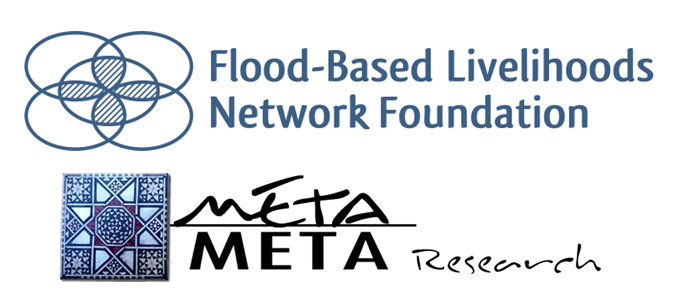
FBLN Sudan
- Home
- Flood-Based Livelihoods Network
- FBLN Sudan
Characteristics of FBL in the country and the geographical scope
With a total irrigated area of 285,000 ha, spate irrigation in Sudan is a crucial contributor to poverty alleviation and constitutes an important rural livelihood in the most marginal areas of the country. During the British colonial times, several large spate irrigation systems were developed, particularly the Gash (1920s) and Toker (1860s) systems. The Gash Agricultural Scheme (GAS) in Kassala State is irrigated by the Gash River, which originates from the Ethiopian and Eritrean Highlands and ends in a highly fertile inner-delta. The Gash River flows for an average of 88 days each year during which it yields amounts up to 650 Mm3 a year. Originally, the scheme produced cotton, but now sorghum dominates together with castor, sunflower and groundnuts.
Other areas where flood-based farming is practiced are the Toker Delta in the Red Seas State, which is fed by the Baraka River and has an annual yield of 550 Mm3, Khor Abu Habil in Kordofan, and Hud El Silem in Northern Sudan. All these areas are characterised by high poverty levels, and if well managed, spate irrigation systems can make a substantial difference to local food security.
Main achievements in the past years
The FBLN Sudan Chapter has over the years been instrumental to strengthen the network of farmers that operate in the spate irrigated agricultural schemes. Being a research organisation, it has had a strong focus on the dissemination of knowledge products. Solution-oriented research has related to the areas of river morphology, the role of Water User Associations to improve water management, economic analyses of the spate irrigation systems, and approaches for the optimal design and management of field water distribution structures. HRC is involved in capacity building related to water management and agronomic practices, and in the organisation of workshops to exchange experiences in flood-based farming. Many efforts are made to strengthen the work of government authorities and other IFAD-funded programmes.
In December 2012 The Sudan Spate Irrigation Network, together with the Hydraulic Research Center, Ministry of Water Resources and Electricity and IMAWESA, organised a WUA to WUA workshop. It was attended by 80 farmers and WUAs leaders from Ethiopia, Sudan and Yemen. They had meetings and discussions for four days in Kassala. And they agreed on several recommendations for more effective and viable contribution of WUAs towards better management of spate irrigation systems.
Here you will find some documents regarding the workshop:
- Sharing Experiences among Water User Associations in spate irrigated schemes, Regional workshop report
- Photo album
For more information and documents see also Sudan Research Program 2011-2014 and the spate irrigation section on Hydraulic Research Center.
During a three-day meeting that started on December 14th, HRC and MetaMeta have delivered the final results and recommendations of their WLE-funded Harnessing Floods project. Within the project, research focused on livelihood and ecosystem services improvement by optimizing the use of seasonal floods. The State Minister from the Ministry of Water Resources, Irrigation and Electricity opened the workshop and attended the full first day. A total of 50 participants were present during the meeting, including farmers and farmer representatives from the three main flood-based farming systems in Sudan (Gash, Tokar and Khor Abu Habil), policy makers and technical experts from various local government and civil society institutions, academic representatives from Khartoum, Gezira and Kassala universities, as well as donors and international development partners (JICA, IGAD and the Netherlands Embassy in Sudan).
